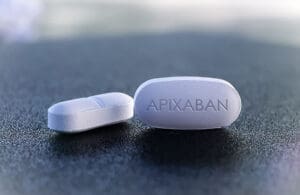
[Adobe Stock]
Those are key takeaways from a retrospective real-world data study presented at the European Society of Cardiology Congress 2023.
ATHENS Study: New insights into Eliquis and Xarelto switching
The ATHENS study focused on patients with non-valvular atrial fibrillation (NVAF) and used a hazard ratio (HR) to quantify the likelihood of stroke or systemic embolism. Specifically, the HR for increased risk for either condition was 1.99, and for major bleeding, it was 1.80, both indicating a substantially elevated risk.
Eliquis has been the subject of several studies at the European Society of Cardiology Congress over the years, starting with a 2008 study evaluating its safety in combination with antiplatelet therapy after acute coronary syndrome. Subsequent research at the congress has generally portrayed Eliquis in a favorable light, highlighting its efficacy, for instance, in stroke prevention and highlighting its safety profile compared to the traditional anticoagulant warfarin.
The latest data from the ATHENS study underscores the need for cautious decision-making when weighing a switch between direct anticoagulant medications such as Eliquis and Xarelto.
Such drugs remain popular thanks in part to growing use to treat conditions such as non-valvular atrial fibrillation (NVAF), a common heart rhythm disorder that ups stroke risk. Last year, Eliquis alone contributed to a combined revenue of more than $18 billion for pharma giants BMS and Pfizer, while Xarelto brought in roughly $7.5 billion for Bayer and Janssen.
Despite their growing use, data has been relatively sparse on the outcomes of switching between direct oral anticoagulants (DOACs), leaving both doctors and patients in somewhat uncharted territory.
One notable example of research in this vein is a 2021 systematic review in the Journal of Thrombosis and Thrombolysis on DOAC-to-DOAC switching. That review, which looked at five large studies involving more than 259,000 patients, found that patients on DOACs were less likely to switch to other DOACs compared to alternatives like dabigatran and rivaroxaban. The study, which pooled odds ratios of 0.29 and 0.58 for switching from apixaban to dabigatran and rivaroxaban, respectively, indicated that apixaban may provide a more stable treatment course.
How real-world data complements randomized controlled trials
While randomized controlled trials remain the gold standard for establishing drug safety and efficacy, they frequently have limited generalizability, and as a result don’t always mirror real-world settings. Conversely, real-world observational studies such as ATHENS can provide insights into how these medications perform in more diverse and complex patient populations.
In a press release, Dr. Narinder Bhalla from Bristol Myers Squibb noted, “Data collected in real-world settings can enhance patient care.” He added that ATHENS data “provides pragmatic information to help clinicians manage the care of their patients.
Filed Under: Cardiovascular, clinical trials, Drug Discovery, Hematology



